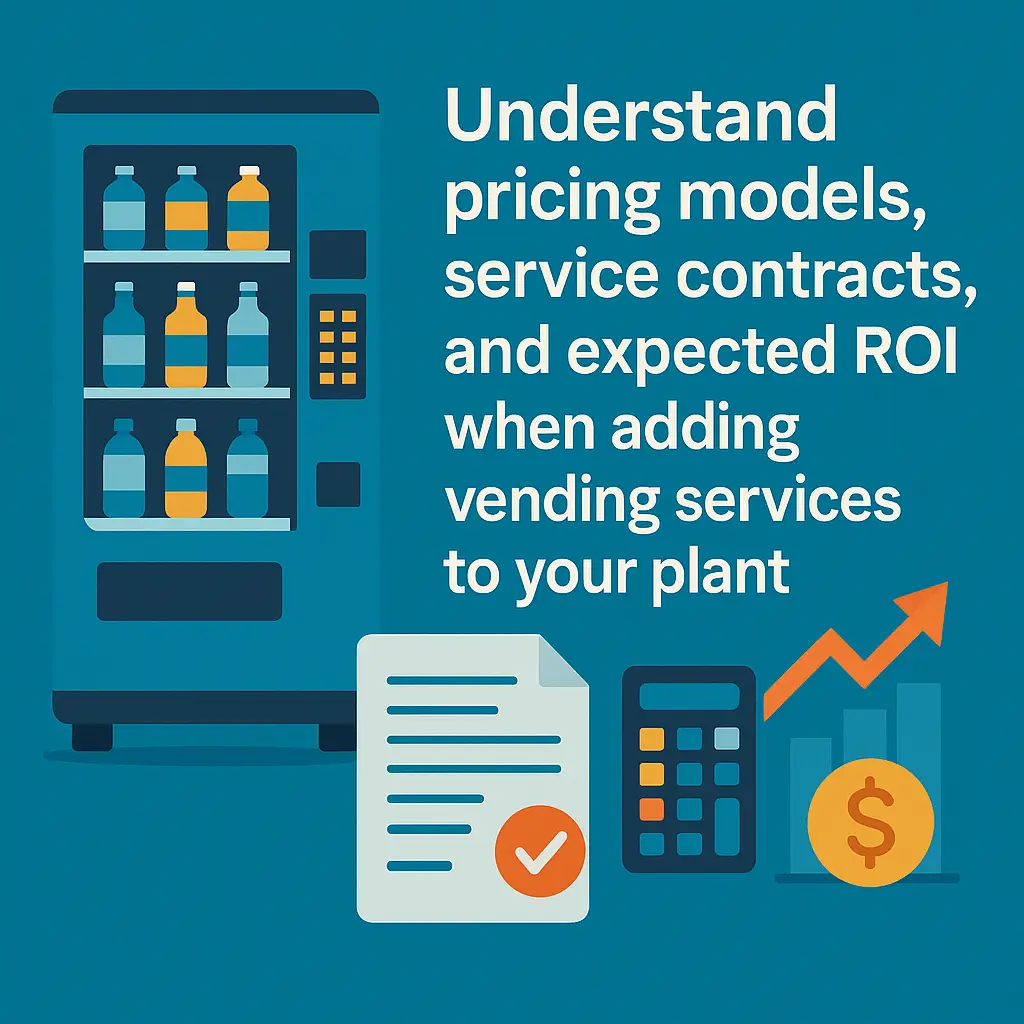Cost of Vending for Manufacturing Plants
Understand pricing models, service contracts, and expected ROI when adding vending services to your plant.
Back to Vending for Manufacturing ResourcesUnderstand pricing models, service contracts, and expected ROI when adding vending services to your plant.
Back to Vending for Manufacturing ResourcesVending costs for manufacturing facilities are often nil if the site qualifies for free service. Machines are installed, stocked, and serviced by vendors at no charge. The key factors are foot traffic, product selection, and payment technology—affecting vendor interest and pricing.
![]() Most vending setups are free to qualifying manufacturing locations
Most vending setups are free to qualifying manufacturing locations
![]() Smart vending boosts uptime and improves employee satisfaction
Smart vending boosts uptime and improves employee satisfaction
![]() Service contracts vary—know what's covered and what's not
Service contracts vary—know what's covered and what's not

When planning vending services for your manufacturing facility, understanding the real cost structure is essential. Fortunately, many vending providers offer free service to qualified locations. This means the vendor installs the machines, keeps them stocked, handles maintenance, and doesn’t charge the facility any setup fees. For most plants, vending becomes a value-added amenity—without a direct cost line item.
Vending machines for manufacturing facilities come in several models, including combo machines, glass-front drink units, and popular AI-powered coolers. While fees are rare for qualifying locations, vendors will assess foot traffic, usage patterns, and operational costs before confirming service terms. In high-use industrial settings, vending machines can support 24/7 workplace needs with drinks, shelf-stable meals, and energy-boosting snacks—all without added staffing needs.
If you're wondering about ROI, the return is mostly realized through employee satisfaction, retention, and productivity. Workers spend less time leaving the plant for food and more time on site, especially during breaks and night shifts. Modern smart vending also reduces complaints tied to older machines—think faster transactions, remote stock monitoring, and fewer breakdowns. Contactless payment options and healthier item choices are additional benefits.
Some facilities may consider a more formal service contract with performance standards. These agreements can include response times for repairs, routine stock checks, or product level guarantees. While these contracts introduce accountability, they may also contain clauses businesses should review carefully to avoid long-term obligations or unfavorable terms.
To make your location more appealing to top-tier vendors, consider factors like machine visibility, ease of access, and around-the-clock foot traffic. Facilities with lunchrooms or near production floors often provide the perfect environment for profitable vending operations. You can also improve offered product mixes by reviewing locations ideal for healthier vending choices, which cater to changing employee preferences.
If you're exploring vending options for your business, Vending Exchange can help simplify the process. Delivery, Installation and Equipment is provided at no cost to you - vendors provide the machines, keep them stocked, and handle all servicing. Whether you need a provider or full-service management, just fill out the form on this page to get started.
Most vending providers offer free service to qualifying manufacturing plants, covering delivery, setup, equipment, and restocking at no cost.
Some contracts may include provisions for revenue splits, service guarantees, or exclusivity clauses. It's important to review terms closely.
Reputable vending providers typically cover repair and maintenance at no charge as part of their full-service offering.
Vendors profit from product sales. High-traffic locations like plants allow them to consistently earn revenue from machine purchases.
ROI often comes in the form of reduced downtime, improved employee satisfaction, and workplace convenience—not direct financial returns.
Yes, vendors often stock items based on employee requests, including snacks, meals, and specific drink brands for each shift.
Not always. Some services work on informal agreements, while others require written service contracts with performance clauses.
Most vending service setups can be completed within 7 days after site approval and vendor match.
AI coolers and smart combo machines are ideal for 24/7 workplaces—they offer varied products and reduce manual servicing needs.
Choose vendors that offer remote monitoring and timely service. Managed agreements can include maintenance performance standards.